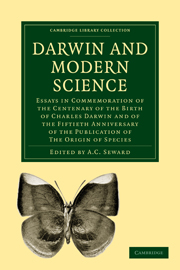 Darwin and Modern Science
Darwin and Modern Science Book contents
- Frontmatter
- PREFACE
- Contents
- LIST OF ILLUSTRATIONS
- DATES OF THE PUBLICATION OF CHARLES DARWIN'S BOOKS AND OF THE PRINCIPAL EVENTS IN HIS LIFE
- I Introductory Letter to the Editor from SIR
- II Darwin's Predecessors
- III The Selection Theory
- IV Variation
- V Heredity and Variation in Modern Lights
- VI The Minute Structure of Cells in Relation to Heredity
- VII “The Descent of Man”
- VIII Charles Darwin as an Anthropologist
- IX Some Primitive Theories of the Origin of Man
- X The Influence of Darwin on the Study of Animal Embryology
- XI The Palaeontological Record. I. Animals
- XII The Palaeontological Record. II. Plants
- XIII The Influence of Environment on the Forms of Plants
- XIV Experimental Study of the Influence of Environment on Animals
- XV The Value of Colour in the Struggle for Life
- XVI Geographical Distribution of Plants
- XVII Geographical Distribution of Animals
- XVIII Darwin and Geology
- XIX Darwin's work on the Movements of Plants
- XX The Biology of Flowers
- XXI Mental Factors in Evolution
- XXII The Influence of the Conception of Evolution on Modern Philosophy
- XXIII Darwinism and Sociology
- XXIV The Influence of Darwin upon Religious Thought
- XXV The Influence of Darwinism on the Study of Religions
- XXVI Evolution and the Science of Language
- XXVII Darwinism and History
- XXVIII The Genesis of Double Stars
- XXIX The Evolution of Matter
- INDEX
VIII - Charles Darwin as an Anthropologist
Published online by Cambridge University Press: 07 September 2010
- Frontmatter
- PREFACE
- Contents
- LIST OF ILLUSTRATIONS
- DATES OF THE PUBLICATION OF CHARLES DARWIN'S BOOKS AND OF THE PRINCIPAL EVENTS IN HIS LIFE
- I Introductory Letter to the Editor from SIR
- II Darwin's Predecessors
- III The Selection Theory
- IV Variation
- V Heredity and Variation in Modern Lights
- VI The Minute Structure of Cells in Relation to Heredity
- VII “The Descent of Man”
- VIII Charles Darwin as an Anthropologist
- IX Some Primitive Theories of the Origin of Man
- X The Influence of Darwin on the Study of Animal Embryology
- XI The Palaeontological Record. I. Animals
- XII The Palaeontological Record. II. Plants
- XIII The Influence of Environment on the Forms of Plants
- XIV Experimental Study of the Influence of Environment on Animals
- XV The Value of Colour in the Struggle for Life
- XVI Geographical Distribution of Plants
- XVII Geographical Distribution of Animals
- XVIII Darwin and Geology
- XIX Darwin's work on the Movements of Plants
- XX The Biology of Flowers
- XXI Mental Factors in Evolution
- XXII The Influence of the Conception of Evolution on Modern Philosophy
- XXIII Darwinism and Sociology
- XXIV The Influence of Darwin upon Religious Thought
- XXV The Influence of Darwinism on the Study of Religions
- XXVI Evolution and the Science of Language
- XXVII Darwinism and History
- XXVIII The Genesis of Double Stars
- XXIX The Evolution of Matter
- INDEX
Summary
The great advance that anthropology has made in the second half of the nineteenth century is due, in the first place, to Darwin 's discovery of the origin of man. No other problem in the whole field of research is so momentous as that of “Man 's place in nature,” which was justly described by Huxley (1863) as the most fundamental of all questions. Yet the scientific solution of this problem was impossible until the theory of descent had been established.
It is now a hundred years since the great French biologist Jean Lamarck published his Philosophic Zoologique. By a remarkable coincidence the year in which that work was issued, 1809, was the year of the birth of his most distinguished successor, Charles Darwin. Lamarck had already recognised that the descent of man from a series of other Vertebrates—that is, from a series of Ape-like Primates—was essentially involved in the general theory of transformation which he had erected on a broad inductive basis ; and he had sufficient penetration to detect the agencies that had been at work in the evolution of the erect bimanous man from the arboreal and quadrumanous ape.
- Type
- Chapter
- Information
- Darwin and Modern ScienceEssays in Commemoration of the Centenary of the Birth of Charles Darwin and of the Fiftieth Anniversary of the Publication of The Origin of Species, pp. 137 - 151Publisher: Cambridge University PressPrint publication year: 2009First published in: 1909
- 2
- Cited by


